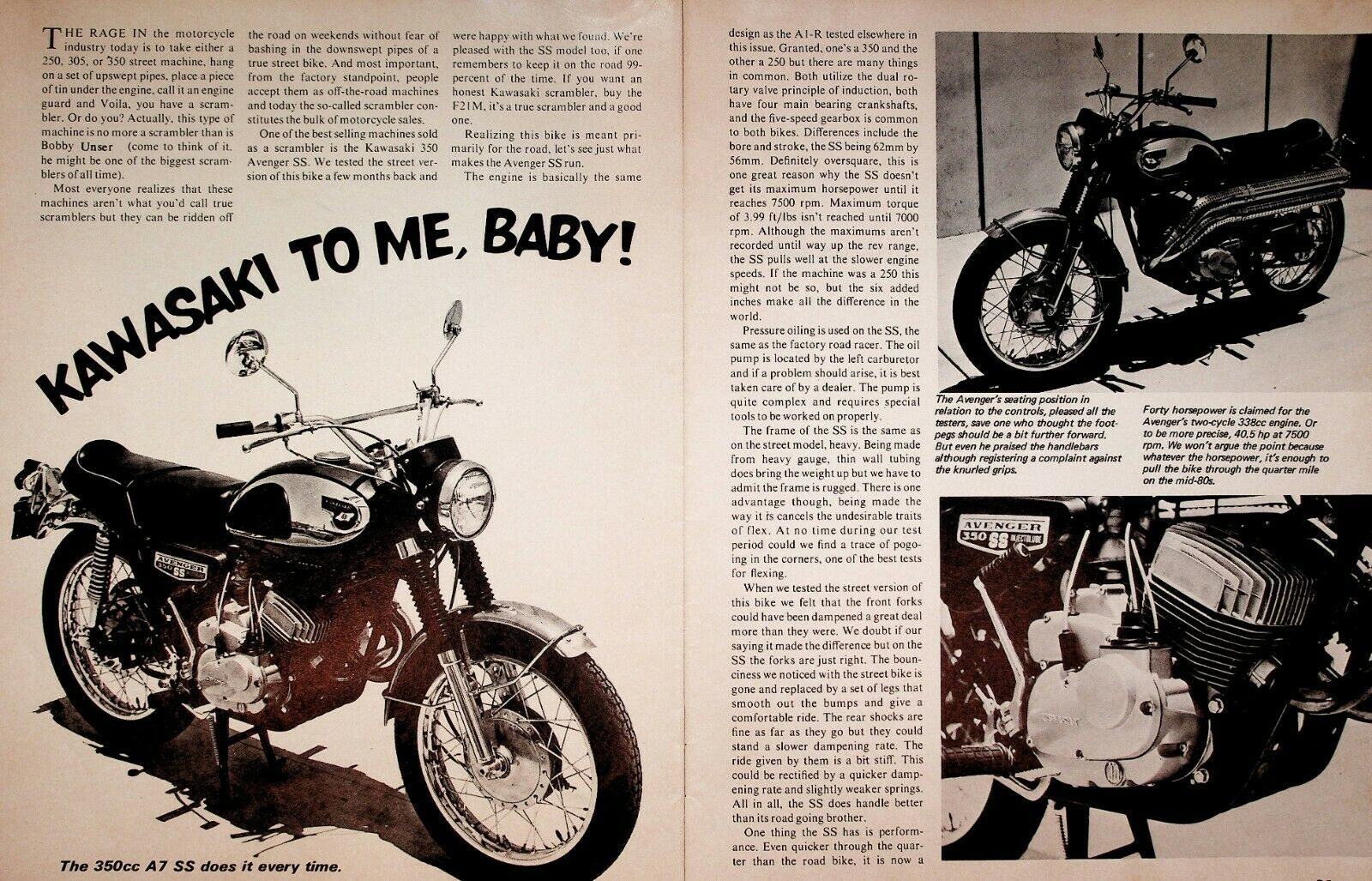-40%
1968 Kawasaki A7-SS Avenger - 6-Page Vintage Motorcycle Road Test Article
$ 7.37
- Description
- Size Guide
Description
1968 Kawasaki A7-SS Avenger - 6-Page Vintage Motorcycle Road Test ArticleOriginal, Vintage Magazine article
Page Size: Approx. 8" x 11" (21 cm x 28 cm) each page
Condition: Good
THE RAGE IN the motorcycle
industry today is to lake either a
250, 305. or 1350 street machine, hang
on a set of upswept pipes, place a piece
of tin under the engine, call it an engine
guard and Voila, you have a scram-
bler. Or do you? Actually, this type of
machine is no more a scrambler than is
Bobby Unser (come to think of it.
he might be one of the biggest scram-
blers of all time).
Most everyone realizes that these
machines aren’t what you'd call true
scramblers but they can be ridden off
the road on weekends without fear of
bashing in the downswept pipes of a
true street bike. And most important,
from the factory standpoint, people
accept them as off-the-road machines
and today the so-called scrambler con-
stitutes the bulk of motorcycle sales.
One of the best selling machines sold
as a scrambler is the Kawasaki 350
Avenger SS. We tested the street ver-
sion of this bike a few months back and
were happy with what we found. We're
pleased with the SS model too. if one
remembers to keep it on the road 99-
percent of the time. If you want an
honest Kawasaki scrambler, buy the
F21 M, it's a true scrambler and a good
one.
Realizing this bike is meant pri-
marily for the road, let’s see just what
makes the Avenger SS run.
The engine is basically the same
design as the A l-R tested elsewhere in
this issue. Granted, one's a 350 and the
other a 250 but there are many things
in common. Both utilize the dual ro-
tary valve principle of induction, both
have four main bearing crankshafts,
and the five-speed gearbox is common
to both bikes. Differences include the
bore and stroke, the SS being 62mm by
56mm. Definitely oversquare, this is
one great reason why the SS doesn’t
get its maximum horsepower until it
reaches 7500 rpm. Maximum torque
of 3.99 ft/lbs isn’t reached until 7000
rpm. Although the maximums aren’t
recorded until way up the rev range,
the SS pulls well at the slower engine
speeds. If the machine was a 250 this
might not be so, but the six added
inches make all the difference in the
world.
Pressure oiling is used on the SS, the
same as the factory road racer. The oil
pump is located by the left carburetor
and if a problem should arise, it is best
taken care of by a dealer. The pump is
quite complex and requires special
tools to be worked on properly.
The frame of the SS is the same as
on the street model, heavy. Being made
from heavy gauge, thin wall tubing
does bring the weight up but we have to
admit the frame is rugged. There is one
advantage though, being made the
way it is cancels the undesirable traits
of flex. At no time during our test
period could we find a trace of pogo-
ing in the corners, one of the best tests
for flexing.
When we tested the street version of
this bike we felt that the front forks
could have been dampened a great deal
more than they were. We doubt if our
saying it made the difference but on the
SS the forks are just right. The boun-
ciness we noticed with the street bike is
gone and replaced by a set of legs that
smooth out the bumps and give a
comfortable ride. The rear shocks are
fine as far as they go but they could
stand a slower dampening rate. The
ride given by them is a bit stiff. This
could be rectified by a quicker damp-
ening rate and slightly weaker springs.
All in all, the SS does handle better
than its road going brother.
One thing the SS has is perform-
ance. Even quicker through the quar-
ter than the road bike, it is now a...
12633e-6808-09









